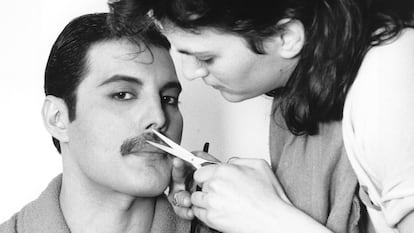How Freddie Mercury posthumously fought against stigma
The documentary ‘Freddie Mercury: The Final Act’ goes far beyond the Queen frontman’s career and the tribute concert at Wembley. It delves into the double discrimination against gays because of their homosexuality and because of HIV at the AIDS crisis

In 1982, a reporter asked Ronald Reagan’s White House Press Secretary, Larry Speakes, about AIDS for the first time. Speakes didn’t know what he was talking about. “What they call the gay plague,” the reporter explained. The presidential spokesman wasn’t the only one in the press room to laugh as he responded, “I don’t have it, do you?”
The scene appears in the documentary Freddie Mercury: The Final Act (available on Amazon Prime). The film begins with the Queen singer’s career—and includes previously unpublished images of his rehearsals with the band—and the tribute concert held after his death. But it also goes much further, illustrating the fight against the double stigma of homosexuality and HIV in the last two decades of the 20th century.
Mercury was talented and charismatic, and he had a prodigious voice. By the mid-1980s, he was filling large venues on Queen’s world tours. The first symptoms of AIDS alarmed him, but he gave his doctor the runaround; he wouldn’t pick up the phone when everything pointed to the fact that he had the disease. It took him months to tell his bandmates, who had already figured it out by then.
The tabloids exploited his case miserably. Mercury wanted to go on until the end, when he was gaunt and had visible skin lesions, but he did not play live shows anymore and took refuge in the studio. Guitarist Brian May composed the song “Show Must Go On” for him; it is considered Mercury’s epitaph. It was not an easy song to perform, but Freddie sang it with all the energy he had left.
In the 1980s, the LGTBI aesthetic was becoming more visible on the pop scene. But mainstream artists still avoided explicitly admitting their sexual orientation and preferred to maintain some ambiguity. Record labels were fearful of the impact that coming out would have on such a broad audience. There were still many conservative voices, in the press and on television, who considered AIDS to be a divine punishment for depravity and promiscuity, something that gays deserved for their eccentric and immoral lifestyle.
Rock Hudson’s 1985 death had an impact around the world: it showed that AIDS was not a disease that only affected marginalized minorities, that it could strike at the heart of Hollywood. Mercury’s death in 1991 was less unexpected, but it served to strike a blow against homophobia. In the last two weeks of his life, the musician secluded himself in a mansion that was besieged by journalists. The day before his death, Mercury said in a press release that he had AIDS.
From then on, his band mates fought to connect Mercury’s persona with the necessary respect for a person’s sexuality and the urgent need to dedicate funds to HIV research. On April 20, 1992, in a packed Wembley Stadium in London, Queen performed for the first time without their lead singer in a concert to benefit the fight against AIDS. Mercury’s beloved voice was replaced by those of other great stars: David Bowie, Elton John, Annie Lenox, Lisa Stansfield, Axl Rose and George Michael.
By the way, some of these artists were homosexuals like the honoree, and in the years that followed, they became less inclined to hide their sexuality. The concert’s message went far beyond the memory of an exceptional musician, and it continues to resonate today.
Sign up for our weekly newsletter to get more English-language news coverage from EL PAÍS USA Edition
Tu suscripción se está usando en otro dispositivo
¿Quieres añadir otro usuario a tu suscripción?
Si continúas leyendo en este dispositivo, no se podrá leer en el otro.
FlechaTu suscripción se está usando en otro dispositivo y solo puedes acceder a EL PAÍS desde un dispositivo a la vez.
Si quieres compartir tu cuenta, cambia tu suscripción a la modalidad Premium, así podrás añadir otro usuario. Cada uno accederá con su propia cuenta de email, lo que os permitirá personalizar vuestra experiencia en EL PAÍS.
¿Tienes una suscripción de empresa? Accede aquí para contratar más cuentas.
En el caso de no saber quién está usando tu cuenta, te recomendamos cambiar tu contraseña aquí.
Si decides continuar compartiendo tu cuenta, este mensaje se mostrará en tu dispositivo y en el de la otra persona que está usando tu cuenta de forma indefinida, afectando a tu experiencia de lectura. Puedes consultar aquí los términos y condiciones de la suscripción digital.









































